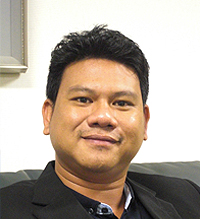“More than 470 bakeries compete in Yangon, both local brands and imported brands” --An interview with the Managing Director of bakery products manufacturing and distributing company in Myanmar
2016/10/7(Fri)11:00
(Myanmar/ミャンマー)
Shwe Kyee International Co., Ltd.
Mr. Aung Chan Nyein (Managing Director)
Myanmar
Many business people from abroad including the emerging countries have participated in HIDA training programs. Positions of the targeted audience vary with the programs, and there are some programs aimed for top executives.
This time, we interviewed with a person who runs bakery products manufacturing and distributing company in Myanmar.

--Please explain your company profile first.
At first, Shwe Kyee Bakery was founded by my grandparents in 1960 in The’ Daw Town, Mandalay Region, Myanmar. Then my parents extended the business to Yangon in 1997 and registered it as Shwe Kyee International Co., Ltd. in 2010. We are now manufacturing and distributing bakery products. Our business is an SME and has about 400 employees. Our products are a wide range of food product lines such as cake, mooncake, bread, sticky sweet snacks, biscuits, etc. In Myanmar, our brand is well known all over the country.
Maintaining the existing position in our existing market and extending the business to new markets are the main objectives of our top management team. Our emphasis in production is to serve the best taste and quality to our customers.
--Do you think of any challenges that hinder your company business to grow and develop further? What kind of actions do you think need to be taken to address the above-mentioned “challenges”?
To grow further, we need to increase production capacity and extend into foreign markets. To increase production capacity, we need infrastructure and technological change. Moreover we need to manage production effectively and efficiently. So change in management style is also important.
So we are planning and constructing new infrastructure and renovating old infrastructure. We are looking at new technology and setting the production with new technologies. Then we are learning from and consulting with experienced persons for managing the organization. We are also building human resource capacity for growing the business.
--How do you view the current status of your business in the global market?
We are currently not able to penetrate the global market. However we have been collecting information for over 2 years to get in touch with the new system of production especially with the help from Japanese industry.
--Please tell us about the current market environment of your business in your country.
As our brand is a well-known brand and our products are famous in the country, we have our own market with brand loyalty.
Most of the food manufacturing businesses also have their own markets. For new players, it is important to know consumer behavior and target market segmentation. It is a very competitive market and there are more than 470 bakeries in Yangon, both local brands and imported brands.
--Business customs of your country may differ from those of other countries including Japan. Please use a few episodes to explain your distinctive differences from them in terms of the mindset for working, business culture, and national characters.
As our country is one of the Asian countries, our people are friendly and value both formal and informal social contacts. Most of the business has a strong relationship among employees, employers, customers, suppliers.
To be a sustainable business, we need continuous learning and development. We need to build human capital. So we need continuous training. The difficulties and challenges in our HRD are finding the skilled labor and the high turnover rate. Therefore, it's very important for us to develop our employee skills by ourselves effectively.
--What is your impression about Japan and Japanese companies? Please share with us an episode or experience that surprised or touched you.
First and foremost, I would like to thank HIDA for giving us the great opportunity to visit Japan. As soon as I arrived in Japan, I realized the reception team was very systematic. After hearing the briefing from the coordinator, I understood more about the nature of Japan, which really focuses on systematic preparation down to details.
Then, I would like to express my gratitude to every teacher and facilitator for making the upmost efforts during the workshop. From these lessons, I have gained insights into solving everyday problems in my workplace in a way that is practical, radical and effective. The factory visits were wonderful as I was able to witness the great standards in running a business which I will use as a benchmark for my own business. Having the opportunity to visit the town during free time is one of the perks of traveling and I learned a lot about the culture. There was no particular difficulty during my stay there thanks to the impressive organization, so I felt safe and secure.
I do believe I must acquire the equipment and technologies from Japan in order to apply them in my business, which will surely set high standards in my industry. I felt inspired to see that Japanese factories have brilliant standardization which comes from systematic control of the whole process. I will use my knowledge and skills I learned from this visit (to name a few, Total Quality Management, observations at the factory, Standards, Benchmarking, etc.). I believe, with this experience from the visit, I can apply those skills to my business. I hope to learn more again in Japan.
Thank you very much.
![The Association for Overseas Technical Cooperation and Sustainable Partnerships [AOTS]](/application/files/7615/7242/3141/logo-en.png)